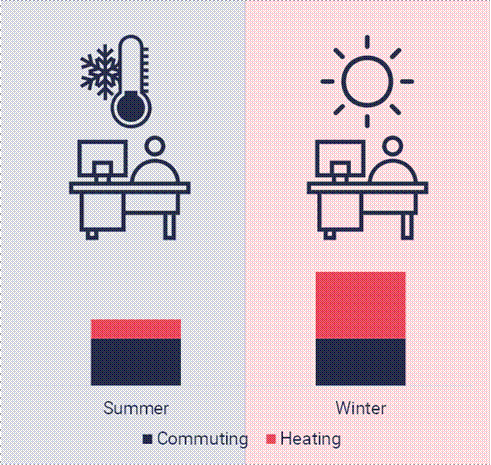
Pitfalls of emissions enablement
The telecoms industry is grappling with sustainability
As one of the key issues of our time, businesses across the globe are grappling with what it truly means to be sustainable as they transition to net zero emissions.
The telecoms industry has been part of the action; disclosing carbon emissions, making net zero commitments, and providing the enabling technology for their customers to reduce emissions. However, enablement is only part of the picture, and by making clumsy claims around enablement, operators face potential pitfalls.
This article examines these pitfalls and offers guidance to operators on addressing these in a practical, tangible way.
What is enablement?
What is meant by enablement in the context of sustainability? As the term might suggest, it is the ability to support a reduction in customers’ emissions by providing the right technology, products or services. A good example is this report published by the GSMA which provides a view on the GHG emission-reduction possibilities that mobile communication technologies enable. According to OECD statistics on Greenhouse Gas Emissions, the enabling impact of the telecoms industry in 2018 was estimated to be around 2,135 million tonnes of ‘CO2 equivalent’ greenhouse gases (CO2E). The GSMA article states that, in contrast, the industry itself was responsible for approximately 220 MtCO2e , so a positive offset of approximately tenfold.
The report goes on to note that emissions in buildings, transport, manufacturing, and energy sectors can be avoided through leveraging energy efficient technologies that aid consumption reduction. For example, the telecoms industry can reduce transport emissions by providing telematics technology to help optimise route (and therefore vehicle fuel) efficiency.
Individual operators, vendors and analysts have produced similar studies (including STL Partners). Stating the potentially positive enabling capabilities of telecoms services is a valid and valuable exercise. However, it is not without pitfalls.
How to approach enablement
In and of itself, enablement is a positive thing if a company’s products and services are genuinely able to contribute to reduced emissions. But it is only part of the picture. Before making these claims, here are four recommendations for navigating what can be a complex landscape:
Acknowledge others
When making claims about enablement, it’s important to acknowledge the entire system that makes positive contributions possible. By definition, enablement leads only to secondary benefits, so telcos must be careful to avoid overclaiming responsibility. For example, by using IoT technology for smart energy systems, an entire ecosystem of partners plays a role in the related emission reduction. The device manufacturers, the energy services supplier, the software solution providers, and the end user, are at least as important as the telco in this scenario. Telcos must be wary of exaggerating their impact by positioning themselves as the sole contributor when ‘claiming’ enablement benefits.
Take a balanced approach
If telcos are willing to claim the secondary benefits of enablement as their own, they must also be prepared to accept the adverse impacts their own industry is responsible for. Acknowledging areas where they can do better can help to avoid reporting bias. For example, encouraging business and enterprise customers to upgrade their handsets every year has damaging environmental consequences (particularly since embedded carbon accounts for over 80% of the emissions arising from smartphones). Any telco making enablement claims must also be careful to point out their internal shortcomings and make it clear that they are also seeking to address these.
Ensure claims are accurate
In a piece of research conducted by the World Resources Institute (WRI) into claims of avoided emissions made by over 300 companies, the WRI found that most claims did not provide the necessary information to back up credibility claims. While this research looked at other industries besides telecoms, it is nonetheless a warranted reminder to those looking to make enablement claims. Ensure reporting covers scope 1, 2 and 3 emissions to make external validation possible, and bolster credibility.
For example, operators often reference working from home as an example of enabling reduced emissions. By providing the connectivity for remote workers to collaborate with their colleagues from the comfort of their own home, this reduces the volume of people commuting into the office and therefore the associated carbon footprint. But this is only part of the picture. Research conducted by WSP UK looked at the carbon output of 200 WSP employees commuting to work combined with home/office heating. The study found that there was only a reduction in overall emissions in the summer – in winter, the amount of carbon emitted from home heating systems was actually greater than the amount produced from the commute. Furthermore, a paper published in Environmental Research Letters synthesised 39 studies across different regions, and found that working from home could potentially increase overall emissions for some of the following reasons:
- Teleworkers moving further away from their offices and therefore making longer commutes on the days they do work in the office
• Time saved from commuting may be spent on leisure activities that also involve carbon emitting activities
• Other members of the household making trips in a car that would otherwise have been in use for commuting
Often, claims of reduced emissions are only part of a wider picture that may be obscured when operators seek to shore up their claims of enablement.
Figure 1: Working from home can actually increase overall carbon emissions when accounting for seasonal factors

Do it for the right reasons to avoid backlash
Given the current ubiquity of corporate messaging around sustainability, it can be tempting to point to enablement as proof of one’s own green credentials. But any such claims should be made for the right reasons – to inspire, motivate, and encourage the right behaviours. Otherwise, telcos can run the risk of attracting adverse attention and being accused of greenwashing by jumping on the sustainability bandwagon as part of their marketing and/or public relations.
In practice, some telcos (and others too) are careful not to attract this level of scrutiny and instead are careful not to make too many bold claims on emissions, even when they have good grounds to do so. However, by ensuring the intention behind the sustainability and enablement claims are genuine, and the information is accurate, telcos can place themselves in the best possible position.
Moving forwards
In summary, enablement can be a positive force in the race towards net zero. However, claims around enablement should be genuine, provable, and balanced. For telcos seeking to strengthen their green credentials, bold claims around enablement should also be tempered by an acknowledgement of the entire ecosystem involved, as well as the other, internal, measures they can take to truly foster a more sustainable future. Finally, some recognition that there may also be instances of negative ‘dis’-enablement would build trust.
How STL Partners can help
STL Partners helps telcos and their partners innovate, grow and stay ahead of the competition. We provide actionable insights and practical guidance on emerging challenges and opportunities, with a focus on innovation and identifying new sources of growth.
Our belief is that by focusing on sustainability and making it a part of company strategy, telcos can innovate, grow, stay ahead of the competition, and have the opportunity to make a big difference to the world in the Coordination Age.
Previous sustainability research from STL Partners:
STL Partners has already been doing a lot of work in this space, as its sustainability practice continues to grow. See our research, articles and webinars on sustainability in telecoms on our new sustainability hub page: https://stlpartners.com/telecoms-sustainability/
Green fleet management: an opportunity for telcos?
Sustainability is a key focus for operators and their enterprise customers. The growing focus on sustainability is opening new ways for telcos to offer enablement services. This article explores the role of telcos in offering fleet management enablement services.
Smart farming & agriculture: What is smart farming and why is it relevant for telcos?
The agricultural industry is a large contributor to global carbon emissions. According to the IPCC, agriculture, forestry and other land-use accounts for 24% of greenhouse gas emissions globally, the second largest industry contribution after electricity and heat production. Efficiency gains made within this industry will therefore have a major impact in the global transition towards net zero emissions.
Telcos can do more to drive mobile e-waste solutions
This article will focus specifically on the issue of E-waste and will explore the potential of telco-driven E-waste solutions.




